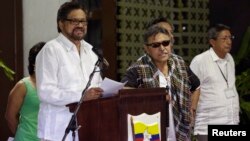Colombian military officers and leftist guerrillas met face-to-face on Friday for the first time in their 50-year war, starting talks on a ceasefire that would take hold should the government and the rebels reach a comprehensive peace agreement.
The government of President Juan Manuel Santos and the Marxist-inspired Revolutionary Armed Forces of Colombia (FARC) have been engaged in peace talks in Cuba for nearly two years,reaching three partial agreements on their five-point agenda.
The two sides recently opened talks on another key point, that of reparations for war victims, and began hearing testimony from those who have lost loved ones or been displaced by Latin America's longest-running conflict, which has killed more than 200,000 people since 1964.
Enacting ceasefire
But peace negotiators decided to get a head start on what is expected to be the most difficult agreement: how to end the conflict and enact a definitive, bilateral ceasefire.
Active-duty officers had never before sat down with members of the FARC to talk peace.
"It is undoubtedly important that for the first time representatives of the active armed forces ... and the FARC have sat at the table under equal conditions," Ivan Marquez, the rebels' lead negotiator, told reporters after the meeting.
"Now is the time for us to get rid of our [military] uniforms," he said.
General Javier Florez, chief of the general staff of the Colombian armed forces, led a special subcommittee that also included officers of the army, air force, navy and police.
Florez, 57, participated in one of the Colombian military's most successful operations against the FARC, in September 2010, when FARC military chief Jorge Briceño was killed. He was also involved in operations that killed top FARC leader Alfonso Cano in 2011 and No. 2 military leader Raul Reyes in 2008.
On Friday, he sat at the same table with rebel commanders led by Marquez.
Difficult wranglings
The FARC has called for a bilateral ceasefire during peace talks, but Santos rejected that, citing a previous attempt at peace talks from 1999 to 2002 when the FARC used the ceasefire to rearm.
"I repeat, so that we are absolutely clear, we are not negotiating a ceasefire for right now," government representative Humberto de la Calle told reporters. "The subcommittee is limited to preparing possible future mechanisms that will only enter in force once we reach a final agreement."
The FARC has laid down its arms for a number of temporary unilateral ceasefires, for example during the run-up to elections this year. But the Colombian army and rebels have engaged in periodic combat throughout the 21 months of peace talks.
Two weeks ago, the center-right Santos was sworn in for a second four-year term after a hard-fought re-election in which right-wing challenger Oscar Zuluaga criticized the talks and threatened to end them if elected.





